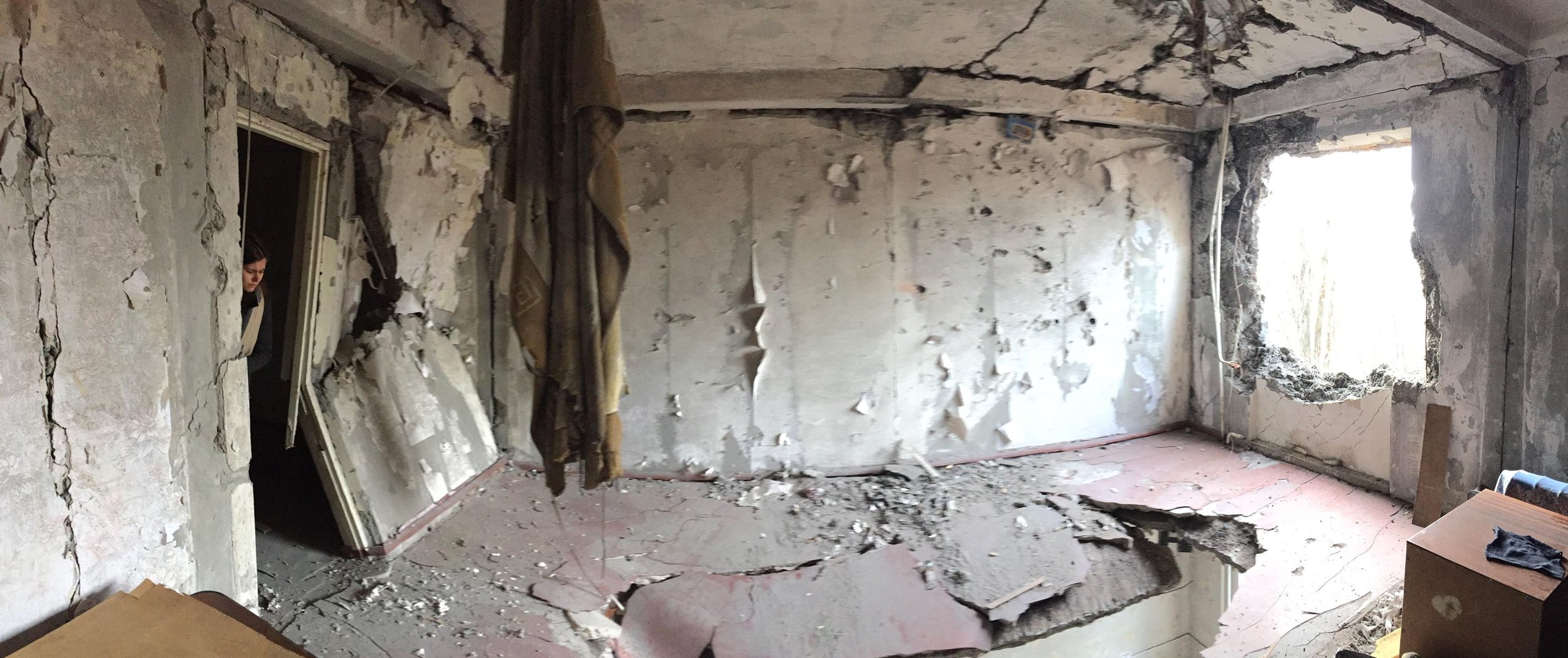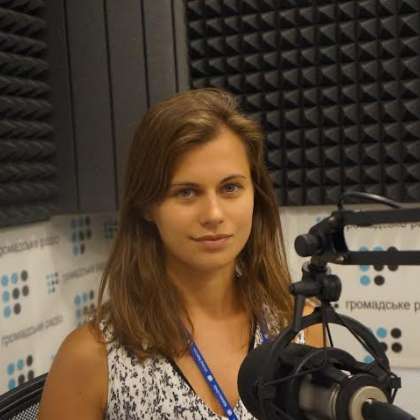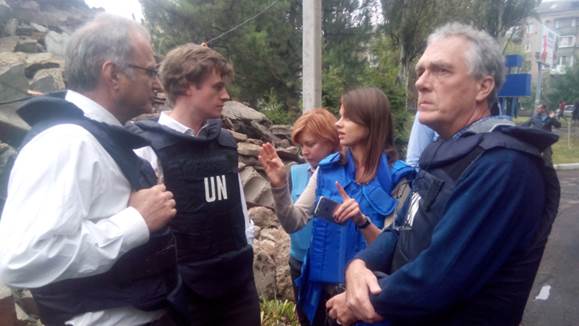Polina Levina Mahnad
/United Nations Human Rights Officer
CV in brief:
Education: School of Oriental and African Studies | The London School of Economics and Political Science
Career so far: Associate Situation Analyst at International Criminal Court | Associate Human Rights Officer, UN Independent Commission of Inquiry for the Syrian Arab Republic at United Nations | Situation Analysis Assistant, Office of the Prosecutor at International Criminal Court
Find Polina online: LinkedIn | Twitter
Exclusive interview by Lucie Goulet, 1 June 2016
You are currently based in Kiev. What do you do there?
I work for the UN Human Rights Monitoring Mission. I joined in September 2015 and was deployed to Donetsk in eastern Ukraine. In January 2016, I moved to Kiev. My official title is Human Rights Officer. I work with the Ukrainian authorities to make sure that there is engagement on the human rights issues that our team documents in the field, across the country. I also work on our mission’s regular public reports, ensuring that we forcefully advocate on human rights, reflect victims’ voices, and raise awareness about the daily suffering that people are going through in eastern Ukraine.
What do you monitor?
Our mission monitors the human rights situation in relation to the conflict in eastern Ukraine and Crimea. In the east, the work I was doing was related to ongoing military hostilities: questions of human rights and international humanitarian law, targeting and how the conflict affects civilians, protection of schools, hospitals, and civilian casualties. Because it is such a politicized context, there is a lot of misinformation about the conflict in Ukraine which could potentially fuel tension. The UN Human Rights mission is a strong voice that seeks to set the record straight on the way the war is being fought, what the government and the armed groups are doing, and the human cost of the ongoing conflict.
We also do a lot of work on detention, documenting ill-treatment, torture, due process and fair trial rights violations in connection with the conflict. We speak to many family members whose loved ones have been detained, often arbitrarily, or disappeared. Many people are looking for their family members and don’t know who to turn to. Often they are isolated behind the ‘contact line’ – the frontline that divides Ukraine and the armed group-controlled parts of Donetsk and Luhansk regions and don’t have access to Ukrainian police or lawyers, who could help them. In this very divided and tragic context, we – the UN Human Rights mission – act as a bridge.
We also monitor how violations and abuses of human rights are investigated. We engage with law enforcement agencies, prosecutors, criminal defense lawyers and attend trial hearings. We work toward making sure that victims, often the surviving family members, have access to justice and that justice is effective. When we see obstacles, we are forthcoming with recommendations and outspoken in our concerns, to ensure greater respect for international standards.
Why did you go to Ukraine?
I previously worked for the UN Human Rights Office in Geneva on Syria. I was based in Geneva because the Commission of Inquiry was never granted access to Syria. I had the opportunity to go on missions to Turkey, Lebanon and Jordan to interview victims and witnesses of human rights violations among the Syrian refugee population. But I wanted to do human rights work in the field, directly engaging with the authorities that have human rights obligations and have the power to affect change. I was motivated to use my legal and human rights skills in a conflict setting to demand protection for the vulnerable and forgotten.
For a long time, I was looking for the right opportunity that would take me to the field, where I would be able to work on the ground and document events as they happened, rather than track violations after the fact. It is actually quite tough to find this kind of opportunity, where the UN enjoys access and is a trusted interlocutor with both Government forces and armed groups, on sensitive human rights issues. It’s also very competitive.
I speak Russian so I thought working in Ukraine would be the perfect opportunity to engage with people directly. Without Arabic, I always had to speak through translators when working on Syria and I could feel a barrier between me and the victims. I knew I could have engaged much better – and much more directly and humanely – if I could speak the same language as the victims, their families, and the authorities.
How did you join the UN?
After my undergraduate studies in International Relations at the London School of Economics, I had a vague idea I wanted to work for an international organisation, but I didn’t know how to go about it.
At the time, I was reading a lot about Louise Arbour and her work as the Chief Prosecutor of the International Criminal Tribunal for the former Yugoslavia and Rwanda. I’m Canadian and she is a prominent female figure who I saw as a role model - a Canadian woman who exemplified Canada’s role in the world. She had made history with the indictment of a sitting head of state, Yugoslavian president Slobodan Milosevic, and to me, was a fearless and astute advocate for human rights and international security through justice.
I applied for an internship at the International Criminal Court at the one division that didn’t require a law degree or legal experience. Meanwhile, I had gotten my first job out of university for a microfinance Inter- American Development Bank project run out of Paraguay. I was learning Spanish, visiting indigenous communities in eastern Paraguay and planning on moving to Havana in a few months. Then one day while on a field trip in a Paraguayan jungle, I woke up to an email saying I had been accepted to the internship program at the Office of the Prosecutor of the International Criminal Court.
I went to The Hague and joined a unit of the Office of the Prosecutor called the Jurisdiction, Complementarity and Cooperation Division, where I got my legal training and cut my teeth in a very rigorous environment. I was hired after my internship and stayed for over two years. I became passionate about human rights, accountability, and rule of law issues through this experience so I pursued a master’s degree in international law at the School of Oriental and African Studies in London. The program at SOAS is excellent and allowed me to delve deeper into the human rights issues facing the Middle East. It was also the year of the Arab spring. Outside of Tahrir Square, I think SOAS was one of the most dynamic places to be – many of my classmates were human rights defenders from the region and I got a real sense of what was at stake.
By the time I graduated, the conflict in Syria had broken out and it became clear that the initial demand for human rights was being subverted and overshadowed by violence and armed conflict. An opportunity came up with a small team at the UN that had been set up on an ad hoc basis to investigate human rights abuses in Syria. It was being renewed every three months because nobody expected the war to last so long. Because I had experience with the ICC, being involved in the investigation and analysis of atrocities, I was able to draw on that. I also saw it as a chance to be part of the UN human rights response to a crisis as it was happening, hoping that the UN would be able to sound the alarm when atrocities began to take place and galvanize an international response.
I hoped that the evidence gathered by the UN could one day be used to hold perpetrators accountable or assist with a post-conflict transitional justice mechanism. At the very minimum, collecting people’s stories just weeks or days after they have fled their homes, has a purpose in and of itself as a way to record history directly from those who lived, suffered and lost – victims’ own truth – rather than from those who may one day win the war and write their own version of events.
I got the job in Geneva at the P2 level, which is entry-level at the UN and quite rare, because it was a small ad hoc team. In a way, I was in the right place at the right time.
What was the application like?
There was a personal history form, i.e. an expanded CV, to fill out. Then I was called for a written test and a phone interview. The whole process took three to four months, which is quite short in UN terms as these processes can often take a year.
What did you do at the ICC?
I was working for the Office of the Prosecutor in the Jurisdiction, Complementarity and Cooperation Division.
This unit looks into conduct that may amount to war crimes or crimes against humanity and assesses whether they can fall under the court’s jurisdiction. Sometimes there are allegations but crimes aren’t well documented, sometimes crimes are already being investigated at the domestic level, or sometimes the ICC doesn’t have jurisdiction. The ICC’s Rome Statute doesn’t cover the whole world, leading to huge gaps in accountability - like Syria.
We looked into whether there were preliminary grounds, based on a list of criteria for the case to be admissible: is there enough information, is the country actually doing anything domestically to hold people accountable for those crimes? Sometimes it can be a long process. There are a few lawyers working on every situation so I got exposure to many different countries and the issues implicated in each one of them. We were looking at Georgia, Afghanistan, Nigeria, Kenya… It was a great place to learn a thousand things a second.
How is it being in Kiev at the moment?
It’s very interesting. Enough time has passed since the Maidan ‘Revolution of Dignity’ that many are asking whether the government has really delivered on what people died for.
Those aren’t questions we are engaging with directly, even though a lot of the reform questions have to do with human rights, like the reform of the judiciary, or of the prosecution service. There are issues with corruption that take up a lot of public space.
We try to shed light on the human rights angle, on the protracted conflict that has been going on for nearly three years and the 30,000+ people who have been killed or injured during that time.
Unfortunately, it is a situation that has fallen off the media’s radar. However, there is this famous Madeleine Albright quote about how peace talks are like mushrooms; they do better in the dark. Even though it’s awful that the situation in the east doesn’t get the attention it deserves, it might be the best time for the parties to work on the peace process as these issues are less politicised.
Do you see yourself staying in Ukraine?
I think so, at least for a bit. It’s tough at the UN because there is an expectation that you will always be moving around. Ukraine is a really interesting mission because our mission works on both sides of the frontline, which is rare for a UN Human Rights Office. We have direct engagement with the armed groups. Even though they don’t give us total access and they don’t always follow our recommendations, they do accept us and they listen to us when we highlight the human rights side of their conduct.
Tell us more about your background in Russia.
My parents are Russian and I grew up in Canada speaking Russian and visiting family in Russia often. My grandmother endowed me with a strong sense of the value of personal histories, of stories and the importance of not forgetting what people live through.
My personal background and family's emigration from Russia gave me an awareness of the practices of unaccountable dictatorships and the long-term cost of silencing human rights abuses.
What was your experience at the LSE like?
I studied International Relations at the LSE. My opinion of the program and university has really evolved through phases. At some point, I was really disappointed because going to university in a big city meant that I didn’t have the same collegiate experience as if I had gone to a campus university.
I missed graduation because I had just found this short term job in Paraguay and I was worried about employment prospects. Many of my friends were going into law, banking and consulting, even though they were interested in foreign policy. I knew this wasn’t what I wanted to do. So when I got a job at a tiny microfinance organisation, in the middle of Paraguay, I went right away.
There were some amazing professors. Christopher Greenwood’s lectures on Public International Law were one of the reasons that motivated me to work at the ICC. His class made me want to go into international law and become a practitioner in the field. I actually ran into him in The Hague once, after he became a judge at the International Court of Justice, and thanked him for his wonderful lectures.







